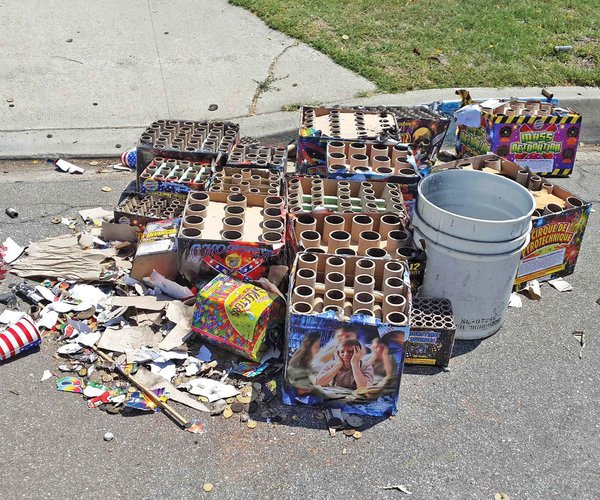In a desire to soften forthcoming increases in rates, Ceres City Council members decided recently they won't take an aggressive tack for water and sewer infrastructure rehabilitation.
Increases in sewer and water rates are inevitable but during a special study session held two weeks ago, councilmen expressed no desire in taking the route that will increase rates to a maximum level.
A consultant hired by the city said that Ceres water rates will need to jump from the current $15.30 per month to $82.30 by the year 2012 if Ceres need its ultimate delivery of 11.5 million gallons per day from a forthcoming surface water plant. The council now does not want to take a course of action that takes rates that high.
City officials know, however, that rates will have to go up for several reasons. Rates have not been raised in the city for well over a decade and Ceres residents pay one of the lowest rates in the area. However, the city must now make significant capital and infrastructure improvements to its aging water and sewer systems.
"Doing so will bring our city into compliance with current standards - and acting now will make necessary upgrades less expensive than waiting for the future," said Public Safety Director Art deWerk, who is concerned about firefighters being able to get adequate water pressure at fire hydrants.
"Water capacity is also a safety issue. By improving its water capacity, the city's firefighters will be able to access adequate water consistently at the levels required to provide safe fire protection to our community," said de Werk. "This is essential to the community's health and safety, and we take this very seriously."
Both water and sewer infrastructure is old and has deteriorated. Water wells must be treated to improve water quality, others need to be upgraded and some wells need to be replaced completely. Also, some older sewer lines in Ceres need to be replaced or maintained more frequently with specialized equipment. Deficient pipes, aging pump stations and undersized and aging infrastructure at the Waste Water Treatment Plant (WWTP) must be replaced and/or rehabilitated.
"These needs are urgent and affect our lives every day," said Mayor Anthony Cannella. "We are doing our due diligence. No one wants to increase rates more than is absolutely necessary. Unfortunately, these needs will not wait. Homeowners face similar issues - if your roof starts leaking you need to fix it; the longer you wait, the worse the problem gets and the more costly it is to repair."
Cannella said while the council is "being careful and studying every option available" he said "any increases will be the minimum required to meet our community's health and safety needs."
Consultant West Yost Associates noted that the city is not presently charging enough to cover costs of doing business in the water division. Rates are no longer adequate because of the expenses of installing water meters, rehabilitating old wells, development of new wells and treatment of ground water. Just playing catch up to match this year's budgeted expenses water rates will have to be increased 65 percent and sewer rates by 41 percent. The current deficits combined are between $600,000 and $1 million per year.
Another consultant, ECO:Logic, suggests that the city needs to raise sewer rates because the cities of Modesto and Turlock, which provide some services to Ceres, have raised their rates. Rates also need to factor in the costs of capital projects to replace aging equipment and facilities.
Sewer rates would need to go from $22.50 per month to $62.13 per month by 2012 in north Ceres and $49.75 per month in other parts of Ceres. The rates would be higher in north Ceres because wastewater is processed at the city of Modesto plant.
Water rates would also be impacted by Ceres' participation in the regional surface water plant being planned by the Turlock Irrigation District. The plant would guarantee that Ceres would have a reliable source of good, clean drinking water. Currently the city relies solely on groundwater, which is not stable in terms of quality and quantity, say city officials. Cannella also noted that ground water is expensive to treat.
Public hearings on rate increases will likely take place in December. The city cannot raise raises under Proposition 218 unless a protest hearing is held and more than 50 percent of property owners return protest ballots.
Increases in sewer and water rates are inevitable but during a special study session held two weeks ago, councilmen expressed no desire in taking the route that will increase rates to a maximum level.
A consultant hired by the city said that Ceres water rates will need to jump from the current $15.30 per month to $82.30 by the year 2012 if Ceres need its ultimate delivery of 11.5 million gallons per day from a forthcoming surface water plant. The council now does not want to take a course of action that takes rates that high.
City officials know, however, that rates will have to go up for several reasons. Rates have not been raised in the city for well over a decade and Ceres residents pay one of the lowest rates in the area. However, the city must now make significant capital and infrastructure improvements to its aging water and sewer systems.
"Doing so will bring our city into compliance with current standards - and acting now will make necessary upgrades less expensive than waiting for the future," said Public Safety Director Art deWerk, who is concerned about firefighters being able to get adequate water pressure at fire hydrants.
"Water capacity is also a safety issue. By improving its water capacity, the city's firefighters will be able to access adequate water consistently at the levels required to provide safe fire protection to our community," said de Werk. "This is essential to the community's health and safety, and we take this very seriously."
Both water and sewer infrastructure is old and has deteriorated. Water wells must be treated to improve water quality, others need to be upgraded and some wells need to be replaced completely. Also, some older sewer lines in Ceres need to be replaced or maintained more frequently with specialized equipment. Deficient pipes, aging pump stations and undersized and aging infrastructure at the Waste Water Treatment Plant (WWTP) must be replaced and/or rehabilitated.
"These needs are urgent and affect our lives every day," said Mayor Anthony Cannella. "We are doing our due diligence. No one wants to increase rates more than is absolutely necessary. Unfortunately, these needs will not wait. Homeowners face similar issues - if your roof starts leaking you need to fix it; the longer you wait, the worse the problem gets and the more costly it is to repair."
Cannella said while the council is "being careful and studying every option available" he said "any increases will be the minimum required to meet our community's health and safety needs."
Consultant West Yost Associates noted that the city is not presently charging enough to cover costs of doing business in the water division. Rates are no longer adequate because of the expenses of installing water meters, rehabilitating old wells, development of new wells and treatment of ground water. Just playing catch up to match this year's budgeted expenses water rates will have to be increased 65 percent and sewer rates by 41 percent. The current deficits combined are between $600,000 and $1 million per year.
Another consultant, ECO:Logic, suggests that the city needs to raise sewer rates because the cities of Modesto and Turlock, which provide some services to Ceres, have raised their rates. Rates also need to factor in the costs of capital projects to replace aging equipment and facilities.
Sewer rates would need to go from $22.50 per month to $62.13 per month by 2012 in north Ceres and $49.75 per month in other parts of Ceres. The rates would be higher in north Ceres because wastewater is processed at the city of Modesto plant.
Water rates would also be impacted by Ceres' participation in the regional surface water plant being planned by the Turlock Irrigation District. The plant would guarantee that Ceres would have a reliable source of good, clean drinking water. Currently the city relies solely on groundwater, which is not stable in terms of quality and quantity, say city officials. Cannella also noted that ground water is expensive to treat.
Public hearings on rate increases will likely take place in December. The city cannot raise raises under Proposition 218 unless a protest hearing is held and more than 50 percent of property owners return protest ballots.





